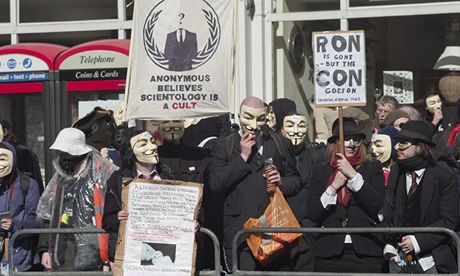
At the same time that the "PayPal14" face felony charges in California for involvement in an Anonymous DDoS campaign in support of WikiLeaks, other Anonymous cells are using their hacktivist energies against feminists who report misogynist harassment on Twitter. Anonymous: a baffling mixture of vital, considered political protest and incomprehensible pubescent wankery.
In one document, an Anonymous cell names four women as having "pull" in getting Twitter accounts suspended; two feminist activist groups are also criticised, despite having no such power. This hints that the Anonymous cell's problem is not feminists with influence over Twitter per se, but the feminist goal of changing attitudes to gendered hate speech. And herein lies a delicate tension: what, for some Anonymous cells, constitutes feminazis instigating an evil Trollocaust against free speech, I understand as activists working with an awareness that rape and harassment don't happen in a vacuum, but in a cultural climate in which it is OK to intimidate women sexually.
Meh – misogyny in activist movements. What else is new? Many people think of Anonymous as a whole new kind of beast, an unprecedented cyber child of our times. But, actually, the movement fits quite neatly into a history of leaderless resistance, which has been used in the service of sweet causes, such as environmentalism and animal rights, and less than savoury ones, such as the Ku Klux Klan and neo-nazism. If we think of Anonymous like leaderless resistance – as a mode of activism as opposed to a unified ideological entity – then it's easier to make sense of cells that hack epilepsy forums with flashing animations (lulz!) operating under the same umbrella as cells instrumental to Occupy or the Arab spring.
So Anonymous has a genealogy. It has also inherited its methods from earlier forms of activism. For example, what, at base, is the difference between DDoS (distributed denial-of-service) attacks and masked bodies shutting down a city street or occupying a building, with the aim of causing economic and operational disruption to an ideologically targeted institution? But another thing Anonymous has inherited from its activist forebears, sadly, is systemic blindness to female experience and to gender equality. This was endemic when the movement was still synonymous with 4Chan, but is still very much a part of the fractured phenomenon it has become (campaigns like Anonymiss notwithstanding).
I realise that Anonymous has no central leadership or manifesto and that any overarching statement about its feminist politics is impossible, but I still think it's worth reflecting seriously on the tension between Anonymous's discernible values of anonymity, anti-censorship and lulz, and the goals of feminism.
Some Anonymous campaigns (for example, Steubenville, Maryville, Reteah Parsons, and Hunter Moore) have clear feminist motivations. And while I have nothing but gratitude and admiration for the activists who dedicated their time, energy and expertise to these causes, there is also a critique to be made. These campaigns position Anonymous as a knight in shining armour, bringing justice to wronged victims. They do not change the culture of rape, violence and sexism that underlies the crimes they're avenging.
Rape culture does not exist only in acts of unwanted penetration. It also exists in beliefs and attitudes about men, women, sex and consent. If you want to do more than chop off eternally recurring hydra heads, you need more than vigilante justice. And I'm not saying that there's no role for vigilante justice – Steubenville proves that there is – but it is absolutely hypocritical to clap when one Anonymous cell takes down a big bad rapist, yet cheer on hacktivists who intimidate – under the guise of protecting free speech – those working tirelessly, daily against the sexist behaviours and beliefs that are the root of rape culture.
Anonymous is always anti-authoritarian, but it isn't always anti-hegemonic. Power isn't simply top-down; as thinkers such as Antonio Gramsci and Michel Foucault remind us, power is something that also exists in and through the opinions and actions of the collective. We need to keep an eye on authority, as Anonymous rightly does, but the other eye needs to be on wider social beliefs and behaviours that disadvantage oppressed groups. Any political movement that loses sight of individual freedom is ethically screwed, obviously, but individual freedom in a world where misogynistic abuse goes unchecked isn't freedom at all. Or maybe it is – but only for the aggressors.

